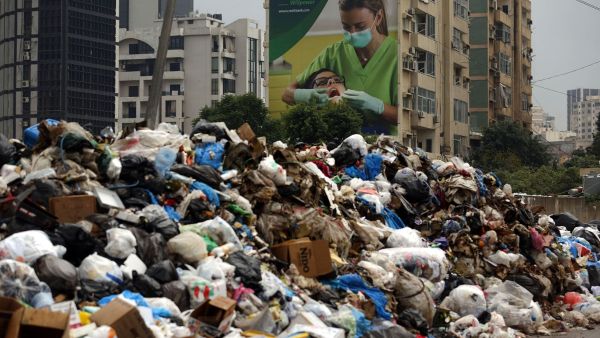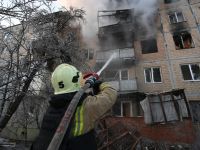- Lebanon's environment minister denied the existence of a trash crisis
- HRW raised alarm in a report on the dangers of burning waste in the country
- 150 dumps are being burned on a weekly basis across the country
- HRW called the crisis "a direct result of the Lebanese government’s mismanagement"
Environment Minister Tarek Khatib denied Monday the existence of a trash crisis in Lebanon after a Human Rights Watch report raised alarm on the ongoing mismanagement of waste. “We are not experiencing a trash crisis,” Khatib said in an interview with OTV. “There is no fear that the trash will come back to the streets.”
The minister said that “we should not alarm the people and face them with a problem that does not exist.”
Khatib also assured that “things are moving in the right direction” when it comes to preventing waste from returning to the streets.
The comments come on the heels of a report released on Dec. 1 by the watchdog organization HRW, titled “As If You Are Inhaling Your Death: The Health Risks of Burning Waste in Lebanon.”
HRW found that 150 dumps are being burned on a weekly basis across the country.
The Environment Ministry provided HRW with information on the total number of dumps, which in 2017 amounted to 941 including 617 municipal solid waste dumps.
The position expressed by Khatib Monday sets itself apart from those voiced by former Environment Minister Mohammad Machnouk and MPs Walid Jumblatt and Wael Abu Faour on Dec. 2, a day after the report was published. Abu Faour called on all ministries to “reduce the catastrophic risk that threatens the life of the Lebanese,” while Jumblatt talked of “slow death” caused by open burning.
While Khatib was not immediately available for comment, an official close to the minister said that a waste management plan will soon be launched, but refused to elaborate further on the proposed solutions. “The plan will be announced when ready but the situation is not alarming,” the source said, adding that the spotlight on the trash situation is the result of media hype.
- Corruption At the Heart of Lebanon's Garbage Crisis: Report
- Lebanon landfill closure once again threatens new trash crisis
“Things have been said to attack the government and the ministry, but the situation is better than before,” the source said.
The official also said the trash problem is currently not “risky or dangerous” and that residents should “inform the authorities about [open] burning.”
According to information collected by the Civil Defense and published by HRW, Lebanon’s Fire Department responded to 3,612 reports of open burning of waste in Beirut and Mount Lebanon, but only 814 in the rest of the country.
HRW found the open burning of waste disproportionately affects residents in lower-income areas where people may be less able to afford medical care, pay for housing relocation or advocate for their rights.
“We are in a garbage crisis whether there is trash on the streets or not,” HRW Lebanon and Kuwait researcher Bassam Khawaja said.
“Just because the government has pushed the garbage out of Beirut does not mean the crisis is over. The government needs to stop ignoring areas outside Beirut and Mount Lebanon, and put in place a plan that covers the whole country.”
In the report, HRW described the current situation as the product of decades of mishandling and said open burning is “a direct result of the Lebanese government’s mismanagement of its solid waste.”
The environment minister did not give HRW an official response, while informal interviews with the Health Ministry and the Civil Defense were included in the body of the report.
This article has been adapted from its original source.








